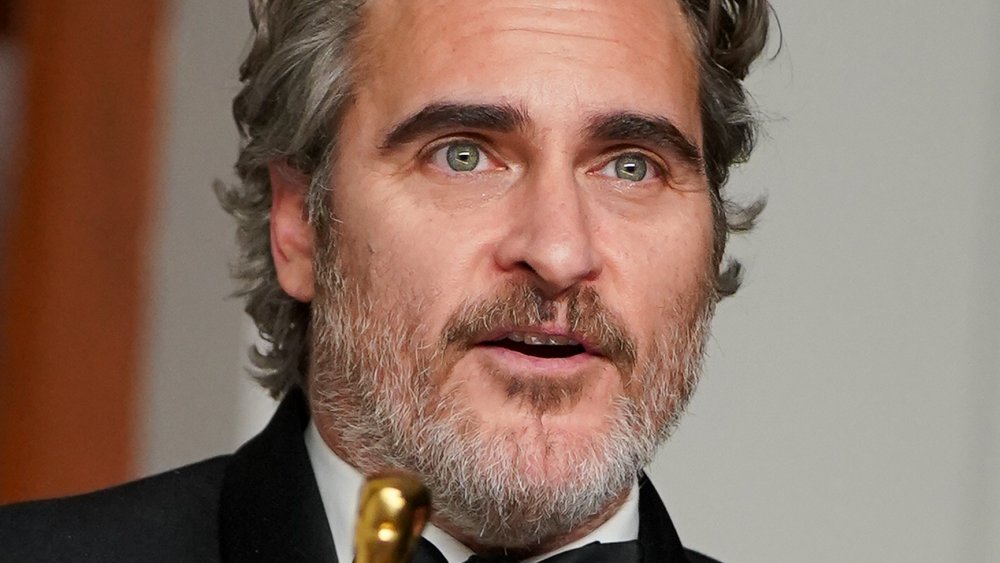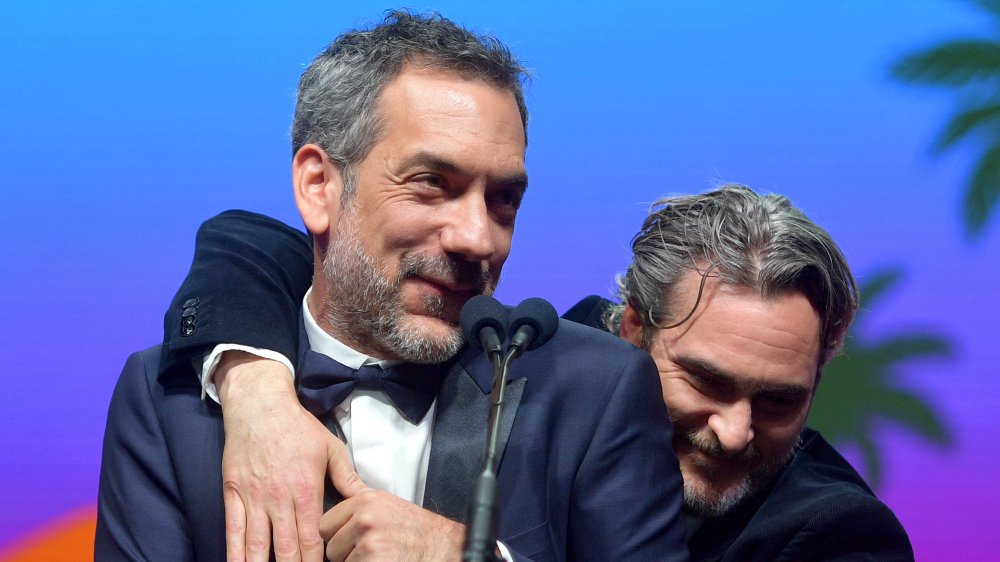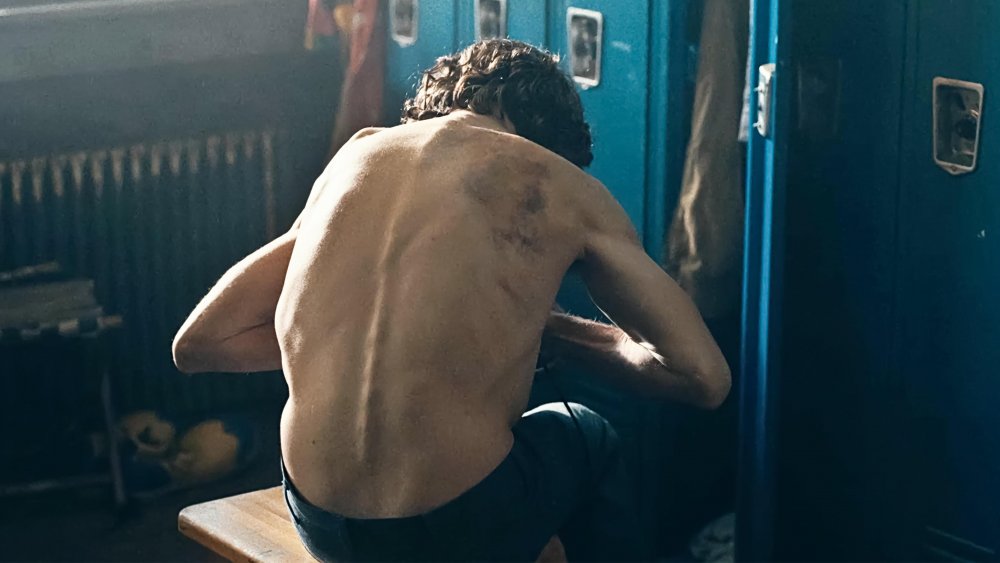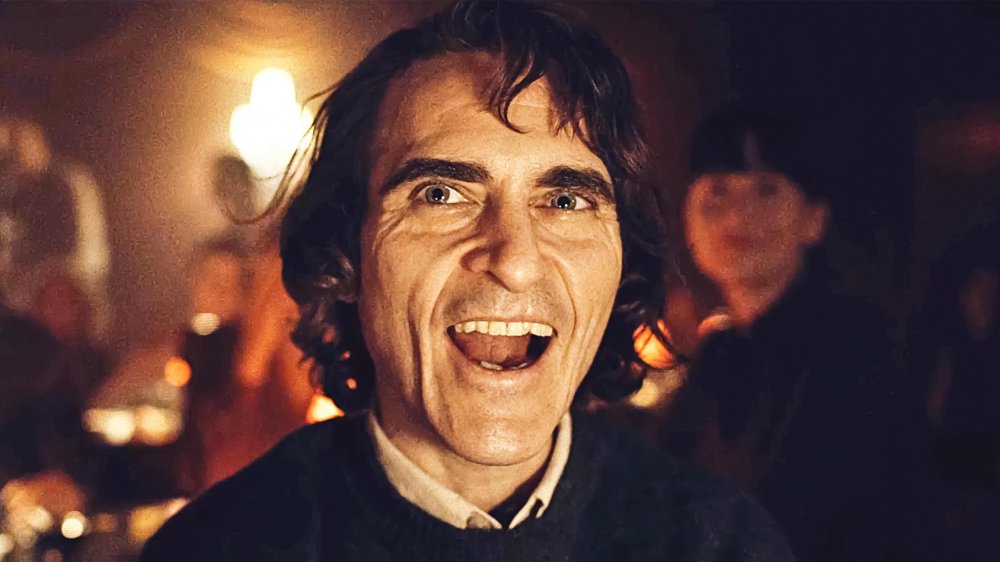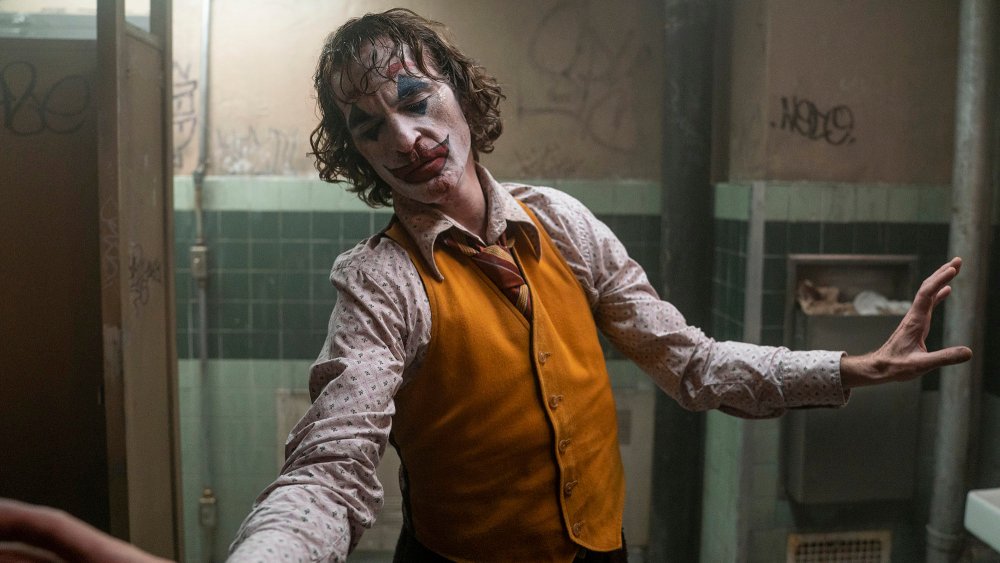What Joaquin Phoenix Really Went Through To Play The Joker
When Joaquin Phoenix won the Best Actor Oscar — unbelievably, his first — for Joker at the 92nd Academy Awards on February 9, 2020, it seemed a bit like he was the only one who was surprised. As is his wont, he accepted the award with a lengthy, at times rambling speech that strayed far from the topic of film; he eventually wrapped up by making the case for us all to be more freely giving of those things which his character in Joker, Arthur Fleck, had been denied.
"Human beings at our best are so inventive and creative and ingenious. I think when we use love and compassion as our guiding principles we can ... create systems of change beneficial to all sentient beings and the environment," the actor said (via The Washington Post). Walking offstage in an apparent daze with his eyes brimming with tears, Phoenix looked at the trophy in his hand and wondered aloud, "Whose is this?" The woman escorting him from the podium assured him that it was, indeed, his — and as it came several decades into a long career during which the intensely guarded actor has shared his tremendous talent with the world without reservation, we can think of few who have deserved it more.
It's accurate to say that crafting his portrayal of Fleck was a hell of a process for Phoenix, and much like the first actor to win a statue for portraying the Clown Prince of Crime — the legendary Heath Ledger — Phoenix went to some places that only the most dedicated actors are willing to go. The actor challenged himself physically, mentally, and emotionally to bring us the best screen performance of 2019, and in doing so, he demonstrated why he is so widely regarded to be in a class all his own.
Joaquin Phoenix had to isolate himself
Although Phoenix famously didn't look to any previous screen interpretations of the Joker — including Ledger's — in crafting his performance, he did share one aspect of the late Dark Knight star's approach to the role. Phoenix found himself very isolated while shooting the film, for a couple of reasons; for one, it was difficult for him to simply turn off Arthur Fleck at the end of the day.
In an interview with Metro, the actor said, " At the end of the night there was never really an end. It stayed with me every night after work for another two or three hours. I never felt this moment of being done with my work day... I didn't socialize at all. The person I interacted with was [director Todd Phillips]. That became my world. It was nonstop."
Phoenix also revealed that as a by-product of his strict diet (which we'll get to in a moment), his opportunities to interact with the cast and crew were even more limited than they might otherwise have been. "I also didn't really have a life at that time because I couldn't go out to eat," he said.
Fortunately, the role was simply so stimulating for Phoenix that he actually found these conditions to be agreeable. "I want to say it was super hard," he said. "But it was so inspiring, that as much energy I put into it, [the role] gave it back. I would go home after work and we would just talk about the next scene. I was just super excited. I would show up at set two hours early to just sit in the trailer and talk about it."
That weight loss was no joke
Phoenix famously lost over 50 pounds for the role of Arthur Fleck; in a wide-ranging talk with USA Today about Joker, he revealed that he subsisted largely on a diet of steamed green beans, apples, and lettuce during the shoot. This was nothing new; he had lost a similar amount of weight for his role in Paul Thomas Anderson's acclaimed 2012 drama The Master. Just because he had done it before, though, doesn't mean that he was in any way keen to do repeat the experience.
"In all honesty, I didn't want to do it again," said Phoenix, who disclosed that the same nutritionist tasked with whittling him down for The Master returned to torment him further for Joker. "It's a horrible, brutal diet, but you get all the vitamins and minerals, so you're like safe. It's grotesque."
Phoenix has been open about the fact that the dramatic weight loss had a profound effect on his mental state, and that he was able to use the psychological difficulty it presented to inform his acting in Joker. If he had been able to have it his way, though, Arthur wouldn't have been the rail-thin, emaciated figure we see in the film. "I [thought] he should be kind of heavy," the actor told the New York Times in an interview a month before the film's release. "Todd was like, 'I think you should do the real thin person.'" His assessment of the experience didn't soften over the months after Joker hit theaters; he told the Times that sticking to the diet was "a horrible way to live."
It wasn't easy to pin down the laugh
Finding his version of the Joker's famous cackle was a particularly daunting task for Phoenix, as the film posited a unique take on that particular trait. Arthur's laughter is pathological, a disorder which causes him to burst into violent, uncontrollable laughter at the most inappropriate of times; part of Phoenix's method for perfecting his version of the Joker's laugh was to study videos of real-life mental patients afflicted with this disorder (via Esquire). For a time, the actor was reluctant to employ the laugh, as he simply wasn't confident that he'd nailed it.
"I think Joker is a part of [Arthur] that's trying to emerge, and I think that was a really interesting way of looking at this laugh," Phoenix explained. "But honestly, I didn't think that I could do it. I would practice alone, and then asked Todd to come over to audition my laugh, because I felt like I had to do it on the spot and in front of somebody else. It took me a long time."
Phoenix has even said that, to a large extent, he's still not sure if he got it exactly right — except in a few instances. Speaking with ETOnline, he said, "I thought at some point that it would become easier, but I don't think it did. I think it became more difficult, actually... There were some scenes where, for whatever reason, it came out and it felt right and other scenes that it was a struggle. Sometimes one take would work and another wouldn't. I think it was something that was alive, in a way."
Joaquin Phoenix had to live with uncertainty
Perhaps the biggest challenge for Phoenix in preparing to play Arthur Fleck was also, in large part, what drew him to the role: an extreme sense of uncertainty. In the USA Today interview, the actor explained that the character has an innate sense of slipperiness to his identity, a resolute unwillingness to allow himself to be pinned down as any one archetype. This quality exhibited itself not only on the pages of the screenplay, but on set, as Arthur's characterization morphed and evolved throughout Joker's shoot.
"When we were prepping for it, I felt very frustrated because I couldn't lock on anything that felt like a foundation for the character," Phoenix said. "And at some point, I realized that was the f***ing point. He was unstable."
Eventually, though, Phoenix — along with Phillips and the rest of Joker's cast and crew — found that this grey area was exactly where they needed to be. "It's shaky ground as an actor," he said. "I enjoy not knowing precisely what a character may do, but you want to have like a couple moments that you feel solid about. And that never really happened. We just became very comfortable with not knowing."
It was a singularly unique approach which led to a singularly unique performance, one which finally netted Phoenix that golden statue which he probably should have been awarded years ago. In his acceptance speech, he told his peers, "We share the same love — that's the love of film. And this form of expression has given me the most extraordinary life. I don't know where I'd be without it."
It's only fitting that this is so, because Phoenix has given us nothing but extraordinary performances — and with Joker, an all-time great one.
